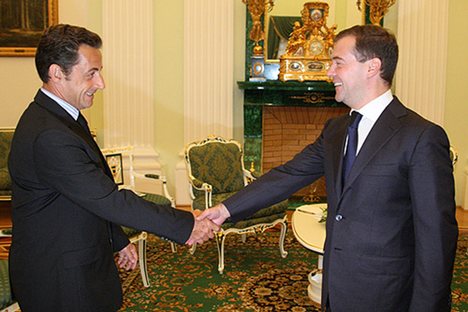
France, Russia Sign Contract On Mistral Warships
Publication: Eurasia Daily Monitor Volume: 8 Issue: 123
By:

As a highlight of the St. Petersburg International Economic Forum (see EDM, June 20), Russian President Dmitry Medvedev witnessed the signing of the contract for two French Mistral-class warships to be delivered to Russia. Negotiations continue for two more ships of the same class, to be built in Russia under French licenses. This is a class of amphibious-assault, helicopter-carrier ships, mainly designed for landing troops on thinly defended coasts in offensive operations.
The contract for the first pair had been expected to be signed during the French annual air show at Le Bourget on June 21, in the presence of Prime Minister Vladimir Putin, who had overseen the Mistral negotiations for Russia. However, the Russian tandem apparently decided to put Medvedev into the spotlight for the endgame.
Medvedev finalized the contract’s terms with French President Nicolas Sarkozy on May 26 in Deauville during the G8 summit. There they agreed on the price, the timetable for construction and delivery, and the technology transfers with the warships (Agence France Presse, Interfax, May 26, 27). US President Barack Obama, attending the Deauville summit, ignored the Mistral deal and its far-reaching implications for NATO. Some allies in the Baltic and Black Sea feel potentially exposed to a new type of threat. Some allies in Western Europe regard the Mistral deal as inaugurating multiple sales of arms and military technology to Russia, aiding the modernization of Russian forces, even as Western Europe cuts back on its own.
Sarkozy welcomed the contract-signing on June 17 in a statement from Elysee Palace. With an eye to his uphill re-election effort, Sarkozy declared that the agreement with Russia creates 1,000 full-time jobs in France over four years, (mainly at Saint-Nazaire, the crisis-hit shipyard). With an eye to French business interests, Sarkozy’s statement hailed the new “strategic dimension of cooperation between France and Russia” (Agence France Presse, June 17). French Secretary of State for Foreign Trade, Pierre Lellouche, on hand for the signing in St. Petersburg, similarly hailed the agreement as a “historical event…the first time Russia imports a weapon-system from a Western country and the first time a Western country exports a weapon-system to Russia after the Second World War” (RIA Novosti, June 17). Formerly a rare Atlanticist in France, more recently a lapsed Atlanticist, Lellouche supports the postulate that French arms sales to Russia should enhance NATO-Russia confidence.
Rosoboroneksport Director-General Anatoly Isaykin and Patrick Boissier, executive president of the Direction des Constructions Navales (DCNS, majority state-owned), signed the June 17 contract. Under its terms, France will sell two Mistral-class ships to Russia for $1.7 billion (1.2 billion Euros). Servicing the ships for an initial period, training of the Russian crews, and the “transfer of technologies” including the electronics, are included in this price. According to French management, their side demands a substantial downpayment before it would start the construction work.
DCNS is acting as prime contractor, subcontracting most of the construction work to the Saint-Nazaire-based STX shipyard (the historic Chantiers de L’Atlantique, now majority South Korean-owned). STX has in turn signed a subcontract with Russia’s United Shipbuilding Corporation (OSK), outsourcing to it a minor share of the work on the two ships’ hulls. Rosoboroneksport acts as Russia’s procurement agent.
The two ships are due for delivery to Russia in 2014 and 2015, respectively. This is conditional on the contract entering into force during this year’s third quarter. According to the Russian side, it needs a few months to complete some procedures. The French side state the contract enters into force when Russia makes the downpayment.
Under the same contract, Russia secures the option to order two more warships of the Mistral-class through another contract. These would be built mostly in Russia under French licenses. The OSK shipyards’ share of the construction work is slated to grow substantially from the first ship to the second, and from the first contract to the next (www.dcnsgroup.com; www.stxeurope.com, June 17, 19; Interfax, RIA Novosti, Agence France Presse, June 17, 18; Kommersant, June 20; Le Figaro, June 22).
According to Russian defense ministry and OSK officials, France has agreed to deliver the highly sophisticated Senit-9 command-and-control and battle-management system with these ships to Russia (Agence France Presse, Interfax, June 17, 20). This remains to be corroborated, however; not least from NATO sources. Although Russia regards a full transfer of the electronics as a matter of prestige, it is the offensive platforms that matter most to Russia and (from an opposite perspective) to Russia’s neighbors.
This contract took two years to negotiate. For most of this time Russian officials were saying on record that four Mistral-class ships could variously be deployed with Russia’s four Fleets (Northern, Baltic, Black Sea, and Far Eastern Fleet). When actually signing the contract, however, Russian officials hinted at priority deployment with the Far Eastern Fleet, ostensibly to defend the Kurile Islands from Japan. Even Russian experts question or dismiss this claim, however (Radio Free Europe, June 17; Nezavisimaya Gazeta, June 21). Mistral-class ships are purely offensive platforms for landing troops on a hostile coast, albeit a thinly defended one (“Mistral-Class Ships To Strengthen Russia Over Maritime Neighbors,” EDM, June 27). Although minimally armed, these ships necessitate naval escort and air cover for their protection while on mission. Russia’s Far Eastern Fleet, however, is not considered capable of ensuring such protection.
France has used its two Mistral-class ships in the Middle East and Africa, mostly on humanitarian missions, occasionally anti-piracy, and without serious danger from hostile navies, air forces, or coastal defenses. France has also deployed these ships (Mistral and Tonnerre) off Libya’s coast during the current war, to operate as helicopter-launching platforms. There they are safe again from any coastal defenses or air attack, although they operate under strong air cover this time. How Russia intends to use its Mistral-class ships, once it takes delivery from France, is far from clear. It would almost certainly tilt the balance of forces in Russia’s favor, compared with the existing situation. This prospect necessitates planning by NATO proactively in the Baltic and Black Sea.




